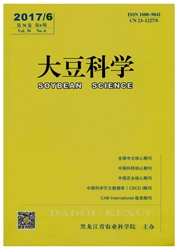

 中文摘要:
中文摘要:
大豆异黄酮通过促进肿瘤细胞凋亡可抑制多种肿瘤细胞的增殖。从大豆提取大豆异黄酮糖甙,再将其部分水解成其甙元,研究大豆异黄酮甙元抑制结肠癌细胞的增殖和促进其凋亡的作用。采用MTT比色法观察大豆异黄酮甙元对结肠癌HT-29细胞增殖的影响,采用TUNEL染色法检测其对HT-29细胞凋亡的影响,采用免疫细胞化学法检测凋亡相关蛋白bax、bcl-2和p53的表达。结果表明:大豆异黄酮甙元可在20~80mg·L^-1范围内时阔和浓度依赖性地抑制结肠癌HT-29细胞增殖和诱导细胞凋亡。用40mg·L^-1大豆异黄酮甙元作用结肠癌HT-29细胞72h时,细胞生长抑制率为(57.1±4.9)%,其对肿瘤细胞凋亡率为(20.9±2.1)%。免疫组化结果还显示,大豆异黄酮甙元可显著性增加HT-29细胞凋亡相关基因bax蛋白表达和降低bcl-2表达。提示,大豆异黄酮甙元可通过诱导结肠癌细胞凋亡发挥抗结肠癌作用。
 英文摘要:
英文摘要:
Soybean isoflavones have been observed to limit the proliferation of tumor cell by inducing apoptosis. Soybean isoflavone glycosides were extracted from soybean hypocotyl, then isoflavone aglycones were prepared by hydrolysis of isoflavone glycosides and its inhibitory effect on proliferation of colon carcinoma cell was investigated. MTF assay was used to examine the proliferation of HT- 29 cell, TUNEL method was used for analysis of cell apoptosis, and immunohistochemical method was used for the determination of bax, bcl-2 and p53 expression. The results showed that soybean isoflavone aglycones inhibited the proliferation and induced apoptosis of colon carcinoma HT-29 cell in a time- and concentration-depend- ent manner in the concentration of 20-80 mg -L-1. Inhibitory ratio of isoflavone aglycones on carcinoma cell proliferation was (57.1 ± 4.9 )% and apoptosis ratio was (20.9± 2.1 )%. Immunohistoehemieal results also showed that isoflavone aglycones significantly increased bax protein expression and decreased bcl-2 level. It is suggested that soybean isoflavone aglycones could exert an anti-colon cancer effect via induction of apoptosis.
 同期刊论文项目
同期刊论文项目
 同项目期刊论文
同项目期刊论文
 期刊信息
期刊信息
